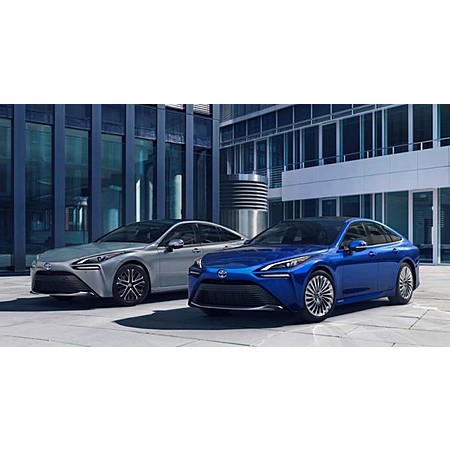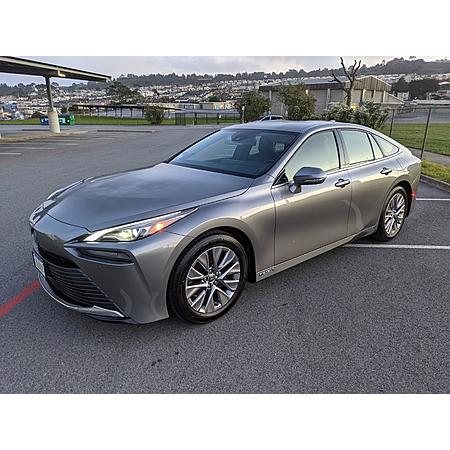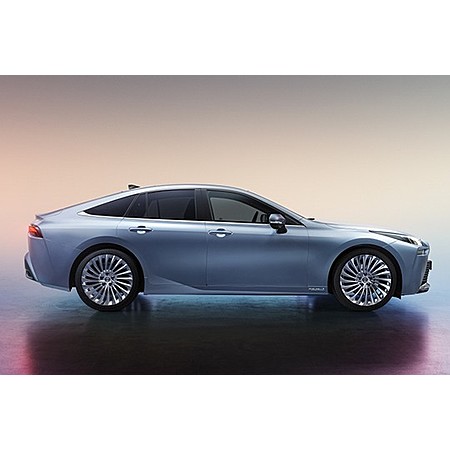Select Eligible Toyota Dealers [
Dealer Locator] located in
Los Angeles / San Francisco, California are offering to
Qualifying Customers: 2021 Toyota Mirai Hydrogen Fuel Cell Car + $15,000 in Complimentary Fuel for 2yrs with
0% APR for 72-Months for as low as
$23,108 after Incentives and Tax Credits. Pricing and availability may vary depending on your location, consult your local eligible dealership for more information.
- Note: Offer is valid at select participating Los Angeles / San Francisco, California locations only. Refer to the forum thread for additional deal details and discussion.
Thank to community member
ExtremeOak for and reddit user
XIIXOO for finding this deal.
Deal Details:
- Visit your local eligible Toyota Norcal Dealer [Dealer Locator]
- Shop for a eligible 2021 Toyota Mirai model that qualifies for the TFS Cash offer and Fuel Card offer mentioned on the page here
- Note: Qualified buyers can finance a new 2021 Mirai at 0% APR for 72 Months.
- Apply for and purchase a qualifying model with prices starting from ~$50,408 (may vary by location)
- Toyota Cash Discount will deduct $20,000 from your total
- You will receive a $4,500 CA Tax Credit (more info)
- You will receive a $8,000 Federal Tax Credit (more info)
- You will also receive a Complimentary Fuel Card valid for up to 2 years or $15,000 of fuel (more info)
- Your total after incentives and tax credits will be as low as $23,108 and will vary depending on your location and model selection.
Additional Details:




Leave a Comment
Top Comments
"The income cap applies for all eligible vehicle types except fuel-cell electric vehicles."
Source: cleanvehiclerebate.org/eng/requirements/1470
1,302 Comments
Sign up for a Slickdeals account to remove this ad.
If as people predict, electricity from renewables becomes cheaper than fossil fuels, then it will also become cheaper to produce hydrogen via electrolysis of water than from fossil fuels. IOW, if you're going to condemn hydrogen fuel cell cars since hydrogen is mostly made from fossil fuels, then to remain logically consistent you also need to condemn EVs since electricity is also mostly made from fossil fuels. If/when the green revolution happens and renewables become cheaper than fossil fuels, then both will simultaneously become fossil fuel-free.
There were efficiency reasons to condemn hydrogen in the past, when electrolysis involved putting metal plates in water and running electricity through them. That had a peak theoretical efficiency of about 65%, and was closer to 30%-40% efficient in practice. And once you factored in all efficiency losses, that made hydrogen fuel cell vehicles less efficient than gasoline ICE vehicles.
But PEM electrolysis is hitting 65%-70% efficiency today, and expected to increase to over 80% in the next decade. Its theoretical max is about 94% efficient. So although hydrogen currently lags EVs and diesel ICE vehicles in efficiency right now, it has the potential to surpass them.
- About 60% of electricity in the U.S. is made from fossil fuels with about 50% efficiency, for an overall efficiency of 70% (if you call renewables and nuclear 100% efficient). Transmission over power lines is about 95% efficient. Battery charging efficiency is about 85%. I haven't found numbers but I assume battery discharging efficiency is about the same since it's the same chemical process in reverse. And electric motor efficiency is about 90%. For an overall EV efficiency of 43% at present.
- That's about the same efficiency as for diesel cars and buses. (Diesel tractor trailers on long haul routes are up around 50% efficient. Ships can hit 60%.)
- Hydrogen works out to 70% efficiency for the electricity, 70% efficiency to produce the hydrogen, 70% efficiency at the fuel cell, 90% efficiency for the electric motor. For an overall hydrogen car efficiency of 31%.
- If you adjust this for electrolysis and fuel cells potentially hitting 85% efficiency in the near future, then hydrogen becomes 46% efficient.
- Gasoline cars are commonly quoted as being about 25% efficient. Though some of the numbers I've been calculating for recent models put them closer to 30%.
You have to understand that when you generate hydrogen via electrolysis, the hydrogen is basically being used as a battery. You store energy in hydrogen via electrolysis, and extract it via a fuel cell. It's functionally no different than a BEV battery which also stores the electricity via a chemical change (albeit an electrochemical change). Just that hydrogen uses an open loop (the water exhaust is released into the environment, and water acquired from the environment is converted into hydrogen), while an electrical battery uses a closed loop (the anode and cathode remain inside the battery pack).From an efficiency standpoint, the winner between hydrogen and BEVs comes down to which chemical process can hit higher efficiencies. And right now, hydrogen is improving efficiency a lot quicker than batteries. Mechanically, hydrogen has more difficulties with transportation and storage, but doesn't have the recharging time problem that electrical batteries do. (And the fact that it's open loop gives it a substantial weight advantage over batteries, which may become important as we try to convert aircraft to electric. Right now if you try to install enough batteries to maintain an airliner's range with aviation fuel, the batteries alone will exceed the plane's maximum take-off weight by a substantial margin.) It's too early to call one the winner. And there may in fact be enough room in the market for both (I dunno why so many people are obsessed with "their" favored horse being the one and only winner).
(You may notice that both EV and hydrogen efficiency increase (finally surpassing diesel) if we can increase the efficiency of electricity generation. I've been saying this for over a decade now. The push for EVs is putting the cart before the horse. Since we use about 3x more electricity right now than all our cars would use if switched to electric, converting our electricity generation to renewables and nuclear first would yield quicker and greater payback than converting to EVs while the majority of our electricity is still produced by fossil fuels. People are too concerned about being green in ways that are immediately visible and they can show off to their neighbors, not enough about ways which aren't as visible but yield the biggest improvements.)
CA is a bit more complex- it's only one per person (or business) but there's some exceptions depending what you bought when-
https://cleanvehiclereb
If as people predict, electricity from renewables becomes cheaper than fossil fuels, then it will also become cheaper to produce hydrogen via electrolysis of water than from fossil fuels. IOW, if you're going to condemn hydrogen fuel cell cars since hydrogen is mostly made from fossil fuels, then to remain logically consistent you also need to condemn EVs since electricity is also mostly made from fossil fuels. If/when the green revolution happens and renewables become cheaper than fossil fuels, then both will simultaneously become fossil fuel-free.
There were efficiency reasons to condemn hydrogen in the past, when electrolysis involved putting metal plates in water and running electricity through them. That had a peak theoretical efficiency of about 65%, and was closer to 30%-40% efficient in practice. And once you factored in all efficiency losses, that made hydrogen fuel cell vehicles less efficient than gasoline ICE vehicles.
But PEM electrolysis is hitting 65%-70% efficiency today, and expected to increase to over 80% in the next decade. Its theoretical max is about 94% efficient. So although hydrogen currently lags EVs and diesel ICE vehicles in efficiency right now, it has the potential to surpass them.
- About 60% of electricity in the U.S. is made from fossil fuels with about 50% efficiency, for an overall efficiency of 70% (if you call renewables and nuclear 100% efficient). Transmission over power lines is about 95% efficient. Battery charging efficiency is about 85%. I haven't found numbers but I assume battery discharging efficiency is about the same since it's the same chemical process in reverse. And electric motor efficiency is about 90%. For an overall EV efficiency of 43% at present.
- That's about the same efficiency as for diesel cars and buses. (Diesel tractor trailers on long haul routes are up around 50% efficient. Ships can hit 60%.)
- Hydrogen works out to 70% efficiency for the electricity, 70% efficiency to produce the hydrogen, 70% efficiency at the fuel cell, 90% efficiency for the electric motor. For an overall hydrogen car efficiency of 31%.
- If you adjust this for electrolysis and fuel cells potentially hitting 85% efficiency in the near future, then hydrogen becomes 46% efficient.
- Gasoline cars are commonly quoted as being about 25% efficient. Though some of the numbers I've been calculating for recent models put them closer to 30%.
You have to understand that when you generate hydrogen via electrolysis, the hydrogen is basically being used as a battery. You store energy in hydrogen via electrolysis, and extract it via a fuel cell. It's functionally no different than a BEV battery which also stores the electricity via a chemical change (albeit an electrochemical change). Just that hydrogen uses an open loop (the water exhaust is released into the environment, and water acquired from the environment is converted into hydrogen), while an electrical battery uses a closed loop (the anode and cathode remain inside the battery pack).From an efficiency standpoint, the winner between hydrogen and BEVs comes down to which chemical process can hit higher efficiencies. And right now, hydrogen is improving efficiency a lot quicker than batteries. Mechanically, hydrogen has more difficulties with transportation and storage, but doesn't have the recharging time problem that electrical batteries do. (And the fact that it's open loop gives it a substantial weight advantage over batteries, which may become important as we try to convert aircraft to electric. Right now if you try to install enough batteries to maintain an airliner's range with aviation fuel, the batteries alone will exceed the plane's maximum take-off weight by a substantial margin.) It's too early to call one the winner. And there may in fact be enough room in the market for both (I dunno why so many people are obsessed with "their" favored horse being the one and only winner).
(You may notice that both EV and hydrogen efficiency increase (finally surpassing diesel) if we can increase the efficiency of electricity generation. I've been saying this for over a decade now. The push for EVs is putting the cart before the horse. Since we use about 3x more electricity right now than all our cars would use if switched to electric, converting our electricity generation to renewables and nuclear first would yield quicker and greater payback than converting to EVs while the majority of our electricity is still produced by fossil fuels. People are too concerned about being green in ways that are immediately visible and they can show off to their neighbors, not enough about ways which aren't as visible but yield the biggest improvements.)
Wow, thanks for the detailed post. I'm not saying hydrogen is better than BEV but I'm in on this deal and hoping hydrogen will improve. I'm not a big "green" guy. I still love my v6 and would buy a V8 if the conditions are right. That said, this deal got me into H2 and I'm enjoying all the research and discussions. If anything, it's made me a lot more interested in alternative fuel, alongside pure electric. The biggest problem with BEVs are the time it takes to charge, the inconvenience of charging when you don't have your own garage, and the low range (compared to gasoline cars). You can get beyond 280 miles (real world = ~200) but you'll have to pay a pretty penny.
I just want a decent $30k non-gasoline car (similar to Honda accord) that can do real world range of 300 miles. 350 is ideal as that's about 1 refuel trip per week for my commute.
With this Mirai, I got the range, the super low price tag, plus luxury features and a smooth ride to boot.
If only Tesla (or any other EV company) can make something below 30k that isn't an ugly Bolt. Model 3 gets close, but I've never seen a new 3 below $50k. It also isn't very luxurious (a few of my friends have it and, I'd rather get a used model S).
Sign up for a Slickdeals account to remove this ad.
I just want a decent $30k non-gasoline car (similar to Honda accord) that can do real world range of 300 miles. 350 is ideal as that's about 1 refuel trip per week for my commute.
With this Mirai, I got the range, the super low price tag, plus luxury features and a smooth ride to boot.
If only Tesla (or any other EV company) can make something below 30k that isn't an ugly Bolt. Model 3 gets close, but I've never seen a new 3 below $50k. It also isn't very luxurious (a few of my friends have it and, I'd rather get a used model S).
Tesla is expected to release a $25K base Tesla 2 in a few years. I suspect the increase amount of legacy makers finally jumping on the BEV train will further price of future models.
China's top selling BEV is around $5K so the market and technology is quickly changing.
As the previous thorough post states that technology improvements will most likely help both BEVs and FCEVs. Exciting time to be alive and if you want and able to get this deal.
https://www.youtube.com/watch?v=846yRFp
Sign up for a Slickdeals account to remove this ad.
https://youtu.be/oOUjqxec4bA
The 2021 Mirai is only built in Japan at the Lexus LFA plant. The Lexus LFA plant built the Lexus LFA $400K supercar. There were only 500 LFAs that was ever built in between 2010-2012. I can only infer that the quality that went into the $400K supercar transferred to the production of the 2021 Mirai. I can tell you from two weeks of owning this car that it's gorgeous and there is not a single imperfection from the production line.
https://www.motortrend.
https://en.wikipedia.or
https://youtu.be/PopzpO-Iu94
Leave a Comment